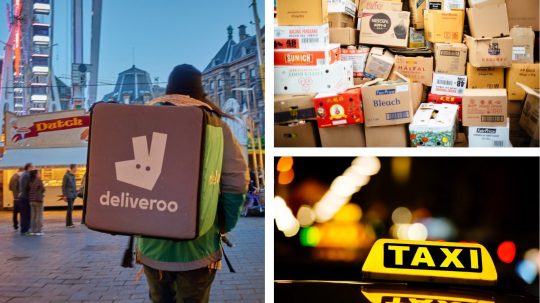Workers in the courier sector are facing harassment and violence at work, according to an Independent Workers’ Union of Great Britain (IWGB) survey.
The survey showed that nine in ten workers have been harassed working for corporations like Deliveroo, with members of ethnic minority groups hardest hit. Reports such as these have shown time and again that Article 14 of the Human Rights Act – which protects against discrimination – is regularly being breached.
Gig economy corporations treat us like we’re disposable, so other people follow suit. It just feels like part of the job at this point.
Out of the 100 couriers who responded to IWGB’s work safety survey, two thirds said they had been physically assaulted while working. Six in ten couriers from ethnic minority groups reported weekly verbal abuse, and physical violence at least once a month.
“I’ve been punched in the face while working. I get harassed in the street every week,” said Jordan Harrison*, a courier based in Manchester. “Sometimes it’s transphobic abuse; sometimes because I’m autistic; sometimes it feels completely random. Gig economy corporations treat us like we’re disposable, so other people follow suit. It just feels like part of the job at this point.”
Almost half (44%) of respondents reported experiencing harassment and verbal abuse at least once every week, revealing endemic abuse of gig workers. The survey is still open to all couriers in the UK to participate and share their experiences.

Credit: Kai Pilger / Unsplash
IWGB believes Deliveroo’s Neighbourhood Watch partnership, which offers training to help drivers keep communities safe, shifts responsibility to counteract abuse onto targeted workers, diverting the focus away from Deliveroo’s failure to support them.
Harrison continued: “I don’t bother telling the company I work for because I know they won’t do anything. We’re not employees so as far as they are concerned – they don’t have any responsibility for us. You can’t even get a human being to talk to on the phone.”
The majority of survey respondents admitted that even when they reported incidents to the app belonging to the company they were working for, it was ignored, or promises to investigate were not kept. The IWGB is calling on all gig economy corporations to take full responsibility for workers’ safety.
“Harassment is endemic in the so-called gig economy because corporations treat it as a Wild West where they have no responsibilities and their workers have no rights,” said Alex Marshall, president of IWGB. “By refusing even to respect the minimum wage or provide human support after someone is attacked on the job, companies like Deliveroo set a toxic precedent that key workers are disposable. We demand action to protect them and hold perpetrators accountable.”

Credit: Carl Campbell / Unsplash
Currently, many such companies’ apps – including Deliveroo’s – impose automatic penalties on any courier who refuses a job, even when it is related to a business or customer where they have been assaulted or abused in the past. IWGB Deliveroo drivers led strike action in April and they are continuing to demand that the corporation take action on harassment and discrimination, allow couriers to refuse unsafe work without penalty and offer rider support.
“This survey provides evidence for what we long suspected was the case – that couriers suffer abuse at unacceptable rates, and that already marginalised BAME couriers, who comprise a majority of the workforce, endure this abuse even more acutely,” added John Kirk, BAME Officer for the couriers and logistics branch of IWGB. “Courier companies who repeatedly make statements expressing concern for the wellbeing of their workers need to look at this data and understand that whatever they think they are currently doing to protect them is entirely insufficient.”
The IWGB conducted a similar survey for private hire drivers after the murder of Gabriel Bringye, who was on a job for Bolt, in February 2020. The survey showed that seven in ten drivers said they had been physically assaulted at work. Takieddine Boudhane, who worked for Deliveroo and Uber Eats, was murdered in the street a month earlier in Finsbury Park, north London.
Without proper protection, the working conditions of gig economy couriers mean that Article 14 of the Human Rights Act is not the only right being breached. Even their right to life, enshrined under Article 2, is under threat.
Names with an asterisk have been changed.






